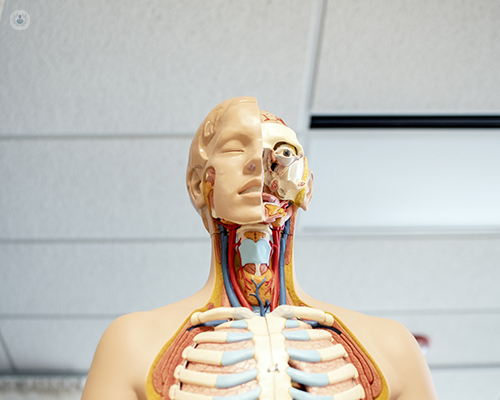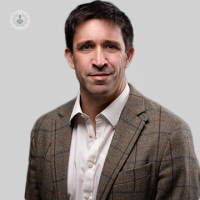What are the main causes of throat cancer?
Written by:Head and neck cancer is a term that includes cancer of the throat, voice box, mouth, tonsils, tongue, as well as the sinuses and salivary glands. There are over 9,000 new cases per year in the UK and the numbers have been increasing each year.
In the past, smoking and to a lesser extent alcohol, were the main causes of throat cancer. Around the world, there are some other causes that we see less in the UK, such as chewing tobacco.

One of the main reasons that throat cancer has been increasing is due to infection by a virus called HPV (Human Papilloma Virus). This is quite a common virus. There are many different types of the virus and many people are infected with it in younger life.
For most people, the virus causes no problems and the body clears it. However, there are a small number of people infected with the high-risk virus types that will go on to form cancer. This seems to cause cancer in the tonsil and at the back of the tongue in particular.
Why have cases of throat cancer been increasing?
Overall the numbers of cancers affecting the head and neck have been increasing. However, that does depend on where the cancer is. In the UK, voice box cancers have been decreasing. This may reflect a change in the number of people smoking and the smoking ban in public.
The biggest increase is in cancers starting in the tonsil and the back of the tongue. This is in part due to the HPV virus. These cancers can present in a variety of ways, including ear pain, swallowing problems, a feeling of a lump in the throat or a neck swelling.
Mouth cancers have also increased. The medical community is less clear on why these are increasing as HPV does not seem to cause them.
Who is most commonly affected?
Throat cancer used to be seen most commonly in the older population. However, due to the increased risk from virus-driven cancer, people can now be much younger.
What can someone do to reduce their risk?
Stopping smoking is a good idea. We do not know how vaping fits in but it almost certainly is better than smoking. Drinking within guidance limits is also important.
At present, there is no evidence that having the HPV vaccine as an adult is useful. Vaccines work best if you have never been exposed to the virus. It is hoped that future generations will be protected from virus-lead cancer by having the vaccine.
One of the most important things to do if you have concerns is to get checked out. Head and neck cancer can be difficult to diagnoses so seeing an expert who is used to looking for the concerning features is important.
Picking up the disease at the earliest stage has the biggest impact on the chances of cure and being able to use the least invasive forms of treatment.
If you have any concerns then do not hesitate to book an appointment with a specialist.


